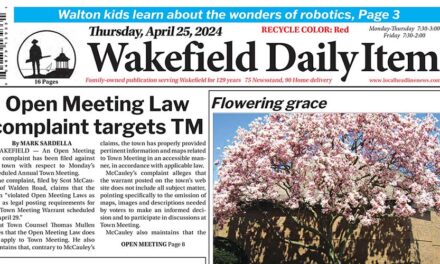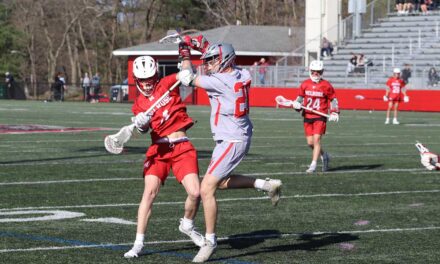By DAN TOMASELLO
LYNNFIELD — A United States District Court judge dismissed a civil rights lawsuit filed by Boston Clear Water Company last month.
The 165 Lowell St. water company and its owner, Anthony Gattineri, filed the lawsuit in the U.S. District Court of Massachusetts in July 2020 after claiming that Gattineri and BCW’s constitutional rights were being violated. Gattineri and BCW sued Select Board member Phil Crawford, former Town Administrator Jim Boudreau, current Town Administrator Rob Dolan, Assistant Town Administrator Bob Curtin, retired Police Chief David Breen, former Conservation Commission Chairman Paul Martindale, retired Conservation Administrator Betty Adelson, Planning and Conservation Director Emilie Cademartori, Health Director Kristin McRae, Building Inspector Joseph O’Callaghan, Building Department assistant Winnie Barrasso, Conservation Geographic Information System (GIS) Coordinator and Field Inspector Patrick McDonald, and Land Use assistant Jennifer Welter. The officials were sued in their official and personal capacities.
U.S. District Court Judge Indira Talwani noted in a decision that Gattineri and Boston Clear Water filed the lawsuit after claiming that “Lynnfield officials conspired with several non-parties to deprive (the) plaintiffs of their constitutional rights and violated state law.” A compliant filed by Gattineri’s attorneys, Hinckley, Allen & Snyder, LLP and Julie Connolly Law, PLLC, claimed that Gattineri was being discriminated against of his “Italian ethnicity, national origin and Native American religious beliefs.” He also claimed that he was being discriminated against because he is Catholic.
Talwani noted in the decision that the town’s attorney for the case, Adam Symms of Pierce, Davis & Perritano, filed a motion to dismiss the lawsuit. The motion was heard in early August.
“To survive dismissal, a complaint must contain sufficient factual material to state a relief that is plausible on its face,” Talwani wrote.
Talwani recalled that Gattineri claimed that a 2019 enforcement order issued by the Conservation Commission constituted an attack on his religious beliefs after the ConCom ordered him to remove two benches with religious inscriptions and a cross from the wetlands buffer zone.
“However, an Essex Superior Court judge upheld the enforcement order, finding that BCW had placed the benches in the buffer zone and that ‘in bringing the cross to the top of the hillside, BCW altered land, without permission, within a resource area,’” Talwani stated.
Talwani also stated that she did not believe that the Conservation Commission had violated Gattineri and BCW’s freedom of religion.
“After removing the time-barred allegations and those contradicted by the findings of fact in the state court actions, (the) plaintiffs’ allegations are insufficient to state a claim under the First Amendment,” Talwani wrote.
Talwani also rejected Gattineri’s argument that town officials had violated his “fundamental right to earn a living under the 14th Amendment.”
“However, the First Circuit has concluded that no such fundamental right exists,” stated Talwani. “The right to ‘make a living’ is not a ‘fundamental right’ for either equal protection or substantive due process purposes. (The) plaintiffs therefore have not stated and cannot state a claim for violation of such a right.”
Talwani also noted in the ruling that the local officials did not violate the 14th Amendment’s Equal Protection clause.
“To state an equal protection claim for selective enforcement, a plaintiff must show that ‘the person, compared with others similarity situated, was selectively treated and that such selective treatment was based on impermissible considerations such as race, religion, intent to inhabit or punish the exercise of constitutional rights, or malicious or bad faith intent to injure a person,’” Talwani stated. “(The) plaintiffs repeatedly assert that they were treated differently from similarity situated individuals and businesses, but they provide few factual alleges in support of that conclusion.”
Talwani also dismissed Gattineri’s argument that the ConCom and the Police Department worked with BCW’s abutters as part of a town-wide conspiracy.
“The amended complaint alleges that the Lynnfield Police Department and the Conservation Commission responded to the neighbors’ complaints about (the) plaintiffs’ work and activities on the property that allegedly violated zoning and conservation regulations, but did not respond to Gattineri’s complaints that (Pocahontas Green Belt Corporation) had conducted illegal activities in the wetlands buffer zone,” Talwani stated. “There is ample evidence from state court litigation, however, that (the) plaintiffs were subject to multiple enforcement orders, which have been upheld by the Superior and Land Courts, and that the Conservation Commission had the right to enter and inspect the property to evaluate compliance with those orders. Where there is no allegation that Green Belt was subject to similar sanctions and oversight for failure to comply with local laws and regulations, (the) plaintiffs have failed to demonstrate that they were ‘similarly situated in all relevant aspects.’ (The) plaintiffs have therefore failed to state a selective enforcement claim.”
Talwani also stated that Gattineri and BCW failed to prove conspiracy claims against the local officials. Subsequently, the judge dismissed the lawsuit.
“Where the court dismisses all of (the) plaintiffs’ federal claims, it declines to exercise jurisdiction over the pendent state law claims,” stated Talwani.
Town Counsel Tom Mullen informed the Villager in an email that he was pleased with Talwani’s ruling.
“The judge dismissed all federal counts against all defendants,” said Mullen. “She declined to rule on the state counts, deciding to let a state court judge handle them if BCW chose to re-file them in state court. It was as complete a victory as you can get in federal court. This case was defended very ably by insurance defense counsel. But BCW has kept the town busy. They’ve appealed rulings of the Conservation Commission to the Superior Court three times, and every time they lost. They appealed all of those losses to the Massachusetts Appeals Court, and lost in the one case that’s been decided so far. They appealed a decision of the Zoning Board of Appeals to the Land Court, and lost. We had to sue BCW to prevent them from violating town bylaws and the rights of neighbors, and they agreed to most of the relief we sought, and then the court allowed some more of it over their objections.”




